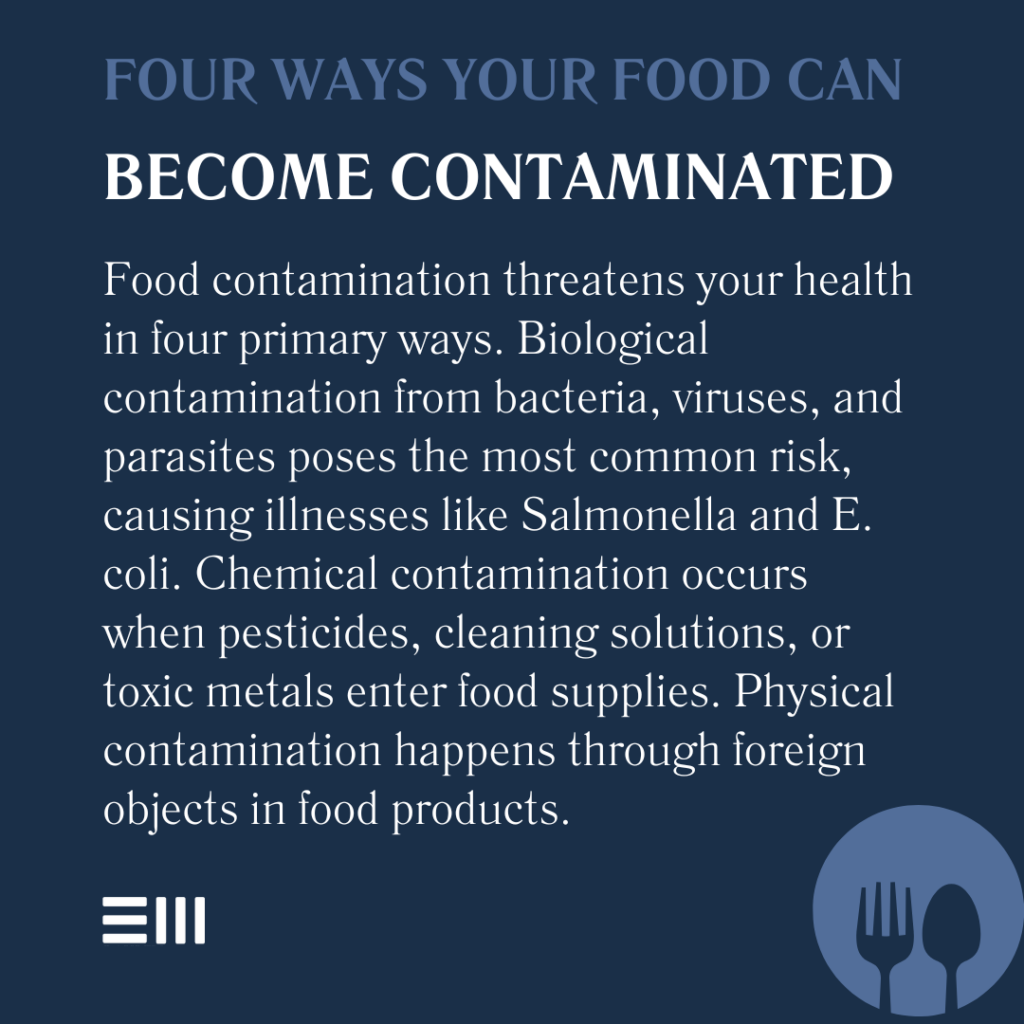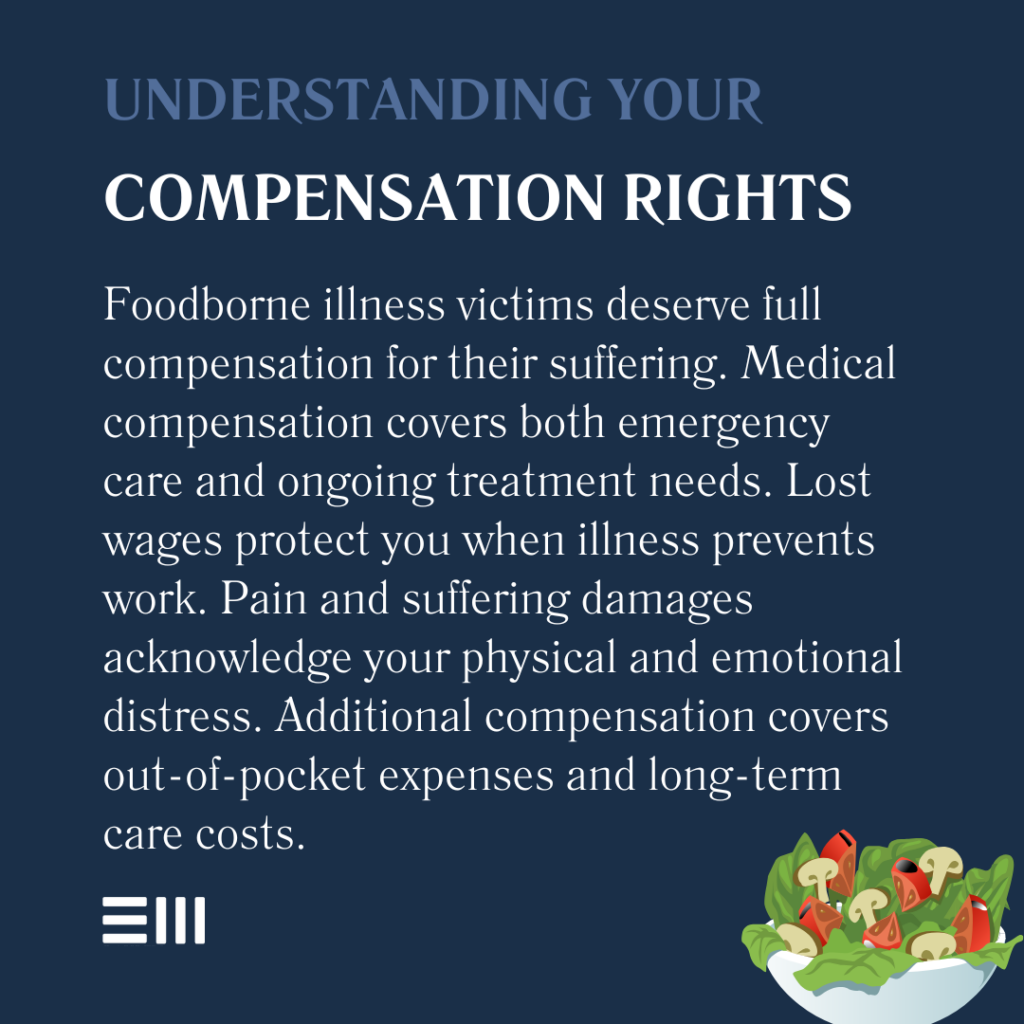
Every year in the United States, 48 million people fall ill from contaminated food, resulting in 128,000 hospitalizations and 3,000 deaths.
Behind each of these statistics lies a story of suffering, medical bills, and lost wages that could have been prevented through proper food safety practices.
Understanding Foodborne Illness Claims in Alabama
Food contamination cases extend far beyond simple food poisoning. From E. coli outbreaks in restaurant chains to listeria contamination in packaged foods, these incidents can lead to severe health complications and significant financial burdens.
Alabama law provides specific protections for victims of foodborne illness, establishing clear pathways for compensation and accountability.
Types of Food Contamination
Food contamination occurs through various mechanisms, each carrying its own legal implications and burden of proof. Understanding these distinctions helps establish liability and pursue appropriate compensation.
- Biological contamination includes bacteria, viruses, and parasites like Salmonella, E. coli, and Listeria;
- Chemical contamination involves pesticides, cleaning solutions, or toxic metals entering food products;
- Physical contamination occurs when foreign objects like glass, plastic, or metal fragments are found in food; and
- Cross-contamination happens when harmful substances transfer between foods during preparation.
The type and source of contamination significantly impact your legal options and potential compensation.
Common Sources of Foodborne Illness
Identifying the source of contamination strengthens your legal claim and helps prevent future incidents. Common sources include:
- Restaurant food preparation areas with inadequate sanitation protocols;
- Improperly stored or transported perishable items;
- Contaminated agricultural products and raw ingredients;
- Food processing facilities with compromised safety standards; and
- Cross-contamination during food handling and preparation.
Understanding the source helps establish liability and determine appropriate compensation channels.

Health Impacts and Medical Considerations
The severity of foodborne illness varies widely, from mild discomfort to life-threatening conditions. Recognizing symptoms and seeking appropriate medical care strengthens both your health outcome and legal position.
Common Symptoms and Conditions
Foodborne illnesses can manifest in various ways, with symptoms typically appearing within hours to days after exposure:
- Severe gastrointestinal distress and dehydration;
- Fever and systemic infections;
- Neurological complications;
- Organ damage in severe cases;
- Long-term health complications; and
- Chronic conditions triggered by food contamination.
Early recognition and documentation of symptoms supports both medical treatment and legal claims.
Risk Factors and Vulnerable Populations
Certain groups face higher risks from foodborne contamination:
- Elderly individuals with compromised immune systems;
- Young children and infants;
- Pregnant women;
- People with chronic medical conditions;
- Immunocompromised individuals; and
- Those with pre-existing digestive disorders.
Special consideration in legal claims accounts for increased vulnerability and potential complications.
Legal Rights and Compensation Options
When foodborne illness strikes, victims have specific legal rights under Alabama state law and federal regulations. These protections ensure accountability and provide pathways to compensation.
Available Compensation Types
Victims of Alabama food contamination may be eligible for various forms of compensation to address both immediate and long-term impacts:
- Medical expenses, including emergency care and ongoing treatment;
- Lost wages and reduced earning capacity;
- Pain and suffering damages;
- Out-of-pocket expenses related to illness;
- Long-term care costs for chronic conditions; and
- Wrongful death compensation for fatal cases.
Each case receives individualized evaluation based on specific circumstances and impacts.
Establishing Liability in Food Contamination Cases
Proving liability requires demonstrating clear connections between contaminated food and resulting illness.
Key elements include:
- Documentation of food consumption from the suspected source;
- Medical evidence linking symptoms to specific contaminants;
- Proof of proper food handling by the consumer;
- Evidence of negligence in food safety protocols; and
- Documentation of similar cases from the same source.
Strong evidence strengthens your claim and increases likelihood of fair compensation.

Prevention and Food Safety Standards
Understanding food safety standards helps prevent illness and strengthens legal claims when violations occur. Businesses handling food must follow specific protocols:
Commercial Kitchen Requirements
Restaurants and food service establishments must maintain:
- Regular health inspections and compliance checks;
- Proper temperature control for food storage;
- Sanitization protocols for equipment and surfaces;
- Employee training in food safety practices;
- Documentation of cleaning and maintenance procedures; and
- Pest control measures and prevention.
Violations of these standards often support liability claims in contamination cases.
Consumer Protection Measures
Individuals can protect themselves through proper food handling:
- Checking expiration dates and packaging integrity;
- Proper storage and refrigeration;
- Following cooking temperature guidelines;
- Avoiding cross-contamination during preparation;
- Regular cleaning of food preparation surfaces; and
- Proper handwashing and personal hygiene.
Documentation of following these practices strengthens claims when contamination occurs despite precautions.
Frequently Asked Questions About Foodborne Illness Cases in Alabama
Understanding your rights and options in Alabama foodborne illness cases helps you make informed decisions about your situation.
Here are answers to common questions we receive from clients.
How Long Do I Have to File a Claim in Alabama?
The statute of limitations for foodborne illness claims in Alabama is typically two years from the date of injury. However, exceptions exist based on when the contamination was discovered and when symptoms first appeared.
What Evidence Do I Need to Prove My Case?
Documentation plays a crucial role in establishing your claim. Important evidence includes:
- Medical records and diagnostic test results;
- Receipts or proof of purchase from contaminated food source;
- Photographs of food items when applicable;
- Witness statements from others who consumed the same food; and
- Documentation of missed work and lost wages.
Preserving all available evidence from the moment you suspect food contamination strengthens your case and increases the likelihood of successful compensation.
How Much Is My Case Worth?
Compensation varies significantly based on:
- Severity and duration of illness;
- Medical expenses incurred;
- Impact on work and daily activities;
- Long-term health effects; and
- Strength of evidence linking illness to contamination.
Each case receives individualized evaluation to ensure fair compensation that reflects your specific circumstances and losses.
Can I Sue if I Got Sick from Home-Prepared Food?
Legal options exist for contamination from purchased ingredients, even if prepared at home. Liability may extend to:
- Food manufacturers;
- Distributors;
- Retailers; and
- Suppliers of raw ingredients.
Our legal team can help trace the contamination to its source and hold responsible parties accountable, regardless of where the food was ultimately prepared.
What if Multiple People Got Sick?
Mass contamination cases often involve:
- Class action potential;
- Stronger evidence of causation;
- Regulatory agency involvement;
- Enhanced compensation opportunities;
- Streamlined legal processes; and
- Greater public health implications.
Multiple illness cases often provide stronger leverage for compensation and can lead to improved food safety practices across the industry.
Taking Action for Your Food Contamination Case
You don’t have to face the challenges of foodborne illness alone. Our experienced legal team understands the complexities of food contamination cases and can help you secure the compensation you deserve.
Contact our office today for a confidential consultation about your foodborne illness case. Our attorneys will evaluate your situation, explain your options, and guide you through every step of the legal process.
Can't find what you're looking for? Search our site below.










